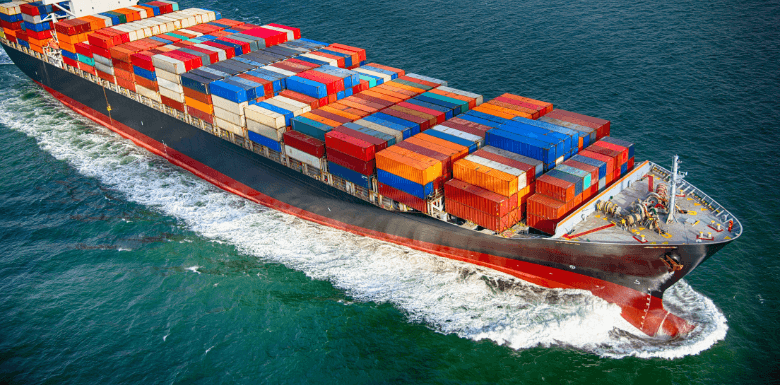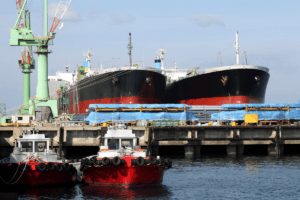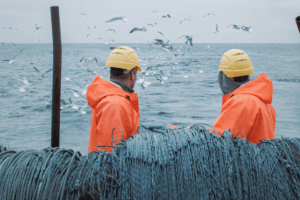
If you are a ship worker or dockworker, you are at high risk of injury from making your living in a dangerous industry. Suffering an on-the-job accident can leave you with substantial medical bills and serious injuries requiring a long recovery. Determining which laws apply in your situation can be confusing without experienced legal guidance.
You don’t have to pay for the consequences of negligent actions by an employer, contractor, or other party. You deserve to secure maximum compensation in your case with the skills of a reputable maritime accident lawyer. The offshore injury attorneys of The Krist Law Firm, P.C. have decades of experience successfully resolving cases involving complex maritime law.
What Is Maritime Law?

- Deaths that occur at sea
- Injury compensation and healthcare for seamen (known as maintenance and cure)
- Licensing and registration for U.S. ships and vessels
- Moving passengers and cargo through U.S. ports
- Negligence committed by ship owners and operators on the open ocean
Today in the United States, much of the traditional principles of maritime law have been codified into the following statutes:
- The Merchant Marine Act of 1928: More commonly known as the Jones Act, this law gives injured seamen the right to sue negligent ship owners and others responsible for their offshore oil rig injuries.
- The Death on the High Seas Act (DOHSA): When workers die on the high seas (more than three nautical miles from shore), certain designated relatives can sue the deceased’s employer for funeral expenses, lost financial support, and the care and emotional support the deceased can no longer provide, among other potential damages.
- The Longshore and Harbor Workers’ Compensation Act (LHWCA): The Longshore and Harbor Workers’ Compensation Act (LHWCA) provides a legal avenue under which non-sailors engaged in maritime industry work can obtain compensation for their injuries.
- The Outer Continental Shelf Lands Act (OCSLA): Under this Act, injured maritime workers who work on certain designated offshore areas can have certain crucial aspects of their claims affected, including the statute of limitations – or the time within which they can file a lawsuit for injuries.
What Is the Law of the Sea?
The law of the sea addresses how countries interact with one another in maritime situations. There are many rules and customs involved, but in 1994 the United Nations condensed and codified these traditions into a single understanding. Titled the United Nations Convention on the Law of the Sea (UNCLOS), it intended to serve as international law governing the following:
- Who has navigational rights: Countries’ vessels are granted the right to pass through the territorial waters of other countries who are part of the agreement. This includes military vessels, although ships can only proceed to their destination and aren’t allowed to cause harm in those waters. They must adhere to the doctrine of “innocent passage.”
- Who has jurisdiction over coastal waters: Territorial waters were originally only three nautical miles from a country’s shore, but UNCLOS extended this to 12 nautical miles. Additionally, countries in the agreement have jurisdiction over adjacent zones totaling 24 nautical miles where they can administer their specific laws on taxes, pollution, and immigration.
- Who has ownership of natural resources: UNCLOS establishes an Exclusive Economic Zone (EEZ) for each country, which extends up to 200 nautical miles from their baseline from which the breadth of the territorial sea is measured or 350 nautical miles from the nation’s continental shelf. Countries have the right to harvest and use natural resources within the EEZ and enforce limitations on other countries.
It’s important to remember that no one owns the ocean. In legal terms, the ocean is known as mare liberum, a concept that stems from a 1609 work called The Free Sea by Dutch thinker Hugo Grotius. Interestingly, the United States did not ratify its participation in UNCLOS. This could introduce more complications into your maritime accident law if you bring it within a state or federal court, but the defendant is international. Your attorney can determine how the law of the sea may affect your case.
How Do Maritime Law and the Law of the Sea Differ?
Maritime law, sometimes called admiralty law, applies only to U.S. domestic ports and our navigable waters. It does not apply outside of these locations. The law of the sea is international and is used by those countries who ratified the UNCLOS to govern injuries that occur in their respective waters.
When it comes to personal injury cases under U.S. federal or state law, the UNCLOS has no jurisdiction and does not apply. This means the law of the sea is not a concern in these claims.
 What Laws Affect a Personal Injury That Happens at Sea?
What Laws Affect a Personal Injury That Happens at Sea?
Personal injury cases at sea are far more complex than those that occur on land. Crewmembers and other maritime employees are not covered under workers’ compensation insurance policies that may assist non-maritime workers. Instead, there are three main legal areas in which remedies are available:
- Jones Act: As mentioned above, the Jones Act allows injured maritime workers the ability to seek compensation against an employer. The worker must be able to prove that the employer acted negligently and that their injuries resulted from this negligence.
- Unseaworthiness: Unseaworthiness is a legal concept that holds vessel owners accountable if their boats, ships, and other maritime vessels are not safe for their intended purpose. If a sea worker is hurt due to a faulty vessel, they may have grounds to pursue an offshore injury claim.
- Maintenance and cure: Maintenance and cure refer to a form of compensation for an injured maritime worker. Maintenance is daily compensation for living expenses and lost income, and cure refers to the payment of medical expenses associated with the injury.
Under these laws, you are entitled to specific entitlements to ensure your safety and prevent injury. Some of these include:
- Access to legal counsel
- Adequate crewmember staffing
- Compensation for any injuries that occur while working on a covered vessel or location
- Elevators and hoists
- Fire suppression systems and equipment
- Properly stored cargo
- Proper training for the crewmembers and captain
- Punitive damages if the defendant refuses to provide maintenance and cure
- Reasonably safe work environments
- Safe living quarters
- Safety guards and rails
- Seaworthy vessels
- Sufficient food and water
Maritime workers may also be eligible for compensation for vocational rehabilitation expenses if they are rendered unable to perform their previous job. They could also qualify for disability payments to reimburse them for lost income, either past or future, in the event of permanent total disability.
How the Limitation Of Liability Act May Affect Your Case
Filing a claim against an employer will typically trigger the company to retaliate and defend itself. In addition to protecting its reputation, the company will want to limit any payout that could affect its profits. It’s crucial that your maritime law attorney prepare for this situation but factor in the employer’s potential defense strategies.
One of the most important ones will be the Shipowners Limitation of Liability Act of 1851. This admiralty law was intended to originally protect ship owners from passenger and crewmember claims from a time when vessels were less safe.
Ways a Ship Owner May Use this Act
A ship owner may use this statute to reduce the amount of damages they are required to pay as a defendant. They can also apply this act to offensively limit their liability by filing a federal petition under the law before they are sued. This can protect them from facing extremely high damage awards from multiple claimants, especially in a single large incident or many related cases.
Other important things to know about this act include:
- Ship owners must file their defense or petition within six months of when they receive notice of a claim against them.
- If they do not act within the six-month timeframe, they waive their ability to use this as a defense.
- Ship owners must present evidence that they did not know about the hazard or issue that a crewmember claims caused their injury.
If your attorney can effectively demonstrate that the cause of your accident was something that the ship owner knew about or should have known about, it can work against this defense. Like all personal injury cases, maritime law claims depend on a preponderance of the evidence to show that it is more likely than not that the defendant was negligent.
What Does a Maritime Lawyer Do?
A Houston maritime lawyer handles a wide variety of offshore injury matters, including wrongful death. When a ship owner and other related parties have failed in their duties to keep a worker safe, an experienced maritime lawyer is needed to hold the negligent parties accountable. Instead of suffering the consequences of someone else’s wrongful actions or carelessness, victims can seek justice and the necessary compensation they deserve.
Maritime law is complex, requiring specific knowledge and experience in handling cases involving the regulations and statutes to represent injured workers effectively. At The Krist Law Firm, each Houston maritime lawyer we offer has managed disputes in navigable waters for decades. If you have suffered injuries while working offshore, contact us to learn more about how we can hold the responsible parties accountable and get you the financial compensation you need to move forward.


 What Laws Affect a Personal Injury That Happens at Sea?
What Laws Affect a Personal Injury That Happens at Sea?